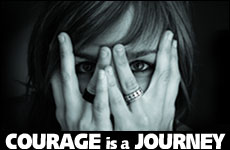 You Know More Hebrew Words Than You Think
You Know More Hebrew Words Than You Think


11 min read
Seven years ago I was diagnosed with breast cancer.
I was 29 years old and a newlywed. The doctors told me I was lucky. A routine physical exam found the lump; early stage cancer was discovered before it had a chance to spread. After lumpectomy surgery and radiation treatment they said there was a 95% chance I would be cured for the rest of my life.
At the time so many people told me how they admired my courage through the whole thing and I never understood why I was considered so brave. I felt guilty putting myself in the category of 'cancer survivor.' I didn't undergo a mastectomy. I never had chemotherapy with its dual challenges of hair loss and nausea. I never even got the sunburn that is common with radiation therapy.
Shortly after my diagnosis I actually separated from my new husband. He was not able to be there for me during my illness. Because of the separation, I moved back in with my mom and dad who took care of me as only one's parents can. They handled nearly all my adult responsibilities. Mom did my laundry and made me dinner. Dad took me to appointments and played endless rounds of cribbage with me to keep me occupied.
My boss took away all deadlines and let me come and go as I pleased with full pay, never charging me one day of sick or vacation leave. She checked with me regularly to see if I needed a break, wanted to leave early or if I just wanted to chat.
I began going to a new community for Shabbos and wound up being hosted regularly by the Springers* -- a rabbinic family who eventually became like my second parents. Rabbi Springer could always make me crack a smile no matter how sad I felt about my situation. He knew me well and helped me understand why God gives personal challenges and how one can grow by facing them with strength. Mrs. Springer always knew the right words to penetrate my heart and mind that would inspire my trust in God's goodness.
I didn't think I was so brave in handling my cancer diagnosis and treatment.
With such a good prognosis for recovery and physical and emotional support, I didn't think I was so brave in handling my cancer diagnosis and treatment.
I felt God's presence in my life so strongly at that time. I credited God for directing me to people who would give me guidance to get through my hard times and come out stronger. With God's help I finished treatment and recovered. I also got out of a bad marriage and re-married to a fantastic man one year later.
NOT SO SIMPLE
Fast forward seven years to the summer of 2006. I'm now a mother with three adorable children under age six, running a busy home – and breast cancer struck me again.
My treatment would not be so simple this time. Thanks again to early detection, this new tumor was caught before it had a chance to spread. I wouldn't need chemotherapy or radiation this time; a left breast mastectomy and subsequent reconstruction was my only option for a cure and recovery. I felt angry, frustrated, and scared.
A tidal wave of fear washed over me... I feared not waking up from the general anesthesia and the pain and disfigurement after surgery. I wondered how my husband and young children would manage without me during my recovery. Dark images of bleeding to death, or dying during the operation through some freak medical mistake disturbed my sleep.
My thoughts ran wild. How could God do this to a mother of three little children who depend on me so much? How could God cause such disfigurement to a 36-year old woman only six years into her marriage? Would I ever look normal in my clothes? Would I ever be attractive to my husband again?
For a variety of reasons, I delayed the surgery for a few weeks. These were very difficult days indeed, but they led me on a journey of understanding. Within those five weeks between my diagnosis and surgery, I grew to see these events as evidence of God's loving involvement in my life. And this was my real discovery of courage.
At first I struggled mightily to accept my diagnosis and was so angry at God. I felt like God was punishing me, for how could He do this if He loved me? I knew it was wrong to be mad at God, but I just couldn't help it. On top of it all, I felt like a bad Jew too.
My anger caused me to stop praying. I just couldn't say the words in the siddur (prayerbook). I tried to say psalms as Jewish women have done throughout the ages in times of trouble, but I just couldn't make myself say those either.
My one saving strength throughout this time was that I didn't want to wallow in my anger and fear; I wanted to conquer it for my own sake and for the well being of my family. I spent a lot of time talking to Mrs. Springer and to our shul rabbi. They assured me that my angry feelings were normal, and that helped.
Day by day we make our peace with God, working through feelings of fear and anger.
"Only a tremendous tzaddik (a very righteous person) can get a cancer diagnosis and immediately find the good," Mrs. Springer explained. "For the rest of us it's a process." Day by day we make our peace with God, working through feelings of fear and anger, and eventually we come to look for ways that even painful events in our lives can be to our benefit. We attain courage little by little.
That bit of clarity enabled me to gradually end the guilt and even overcome my anger towards God. Then I started praying again. A friend advised me to just use my own words to plea for a complete and speedy recovery. I begged God to make my convalescence period as easy as possible for me and my family. My tears cleansed some of the fear and anger out of my heart and eventually I was able to open a prayer book again.
FIGHTING BACK
My desire to fight back against the fear and anger kicked in. I began to actively counter my negativity. As my surgery approached I often told myself, "Gam zu l'tovah" (this too is for the best) and "Gam zeh ya'avor" (this too shall pass), and even, "Hey, I won't have to do laundry for the next four weeks."
I realized that one can actually grow from an experience like mine, and see that God truly loves us since He's made His presence in our lives so palpable. This is the essence of emunah, belief in God. I internalized that all God's plans are somehow for the best, even when we don't know why. This is real bitachon, faith in God. The acceptance of these concepts gave me greater serenity.
By the time I went in for the surgery, though still terribly scared, I was actually sincerely thanking God for this outcome. I would live and be with my family and be rid of my left breast, a part of my body that had twice been caught endangering my life.
The doctors told me that after I would eventually look and feel pretty normal again. I am among the "lucky" cancer patients who didn't have to undergo adjuvant therapies since this tumor had not spread. The surgery was a total cure. I was given a long term survival prognosis. I felt truly blessed as I went into the mastectomy surgery and was looking forward to finally putting this long-awaited event behind me.
Now I felt courageous because I worked hard to come to peace with God. With the help of my parents, brother and a network of caring volunteers my family made it through my hospitalization and gradual recovery. A neighbor marveled at the small army it took to replace all the work I did as a wife and mother.
If I had any remaining doubts about whether God loves me, they were all answered a week after the mastectomy when I got the biopsy results. The microscope found several scattered foci of tumors throughout the breast tissue, too small for detection by mammography or MRI.
My left breast had been a time bomb. Only God could have known about those other seedling tumors in my breast. What would have happened to me a year down the road if I had not had that mastectomy? Even a few more months in the future could have meant the spread of cancer and the addition of chemotherapy to my treatment. Recovery and long term prognosis could have been worse off, too. As I hung up the phone with the doctor, I shuddered and cried. I thought back to when I first told Mrs. Springer about this cancer diagnosis, she had said to me: "I just want you to know that God loves you." I couldn't really integrate her message at the time, but the power of what she said is now deeply ingrained in my heart and mind. The diagnosis and treatment which I had initially viewed as a punishment from God had, in actuality, turned out to be a life-saving gift.
Not everyone gets such answers and peace of mind after a traumatic illness, I know. But at least, when facing a threat to our well being, we can all try to accept God's will and focus on His kindnesses instead of focusing on "why me" -- something we may never really understand.
What are God's kindnesses when someone has a scary medical diagnosis? Health insurance, a top doctor, loving family, excellent spiritual guidance, supportive friends, caring shul members and neighbors, the list goes on. Look at these things in your struggle with an illness or traumatic event as the gifts from God they truly are.
Here are some tips that helped me through my worst of times and could help others too:
By the way, I authored this article using my Hebrew name, Sasha Yonah Bas Kunah Chana. I would appreciate your prayers for my continued and complete recovery. Wishing all my readers only good health and for us all to grow and merit recognizing God's loving hand in our lives.
*Name has been changed.
